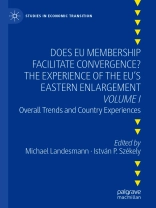This edited volume analyses how EU membership influenced the convergence process of member countries in the Baltics, Central-Eastern and South-Eastern Europe. It also explores countries that are candidates for future EU membership. The speed of convergence of significant groups of low- and medium-income countries has never been as fast globally as it is today. Contributions by lead researchers of the area explore whether these countries are converging faster than their fundamentals and global trends would suggest because of EU membership, with its much tighter institutional and political anchorage
Tabla de materias
1. Introduction.- 2. Convergence of the EU member states in Central-Eastern and South Eastern Europe (EU11): a framework for convergence inside a close regional cooperation.- 3. Towards a new growth model in CESEE: three challenges ahead.- 4. Regional dynamics in EU11.- 5. How the European Union made Poland European Again.- 6. Transformation of the financing and foreign trade model of the Hungarian economy after EU accession.- 7. Macroeconomic trends in the Baltic States before and after accession to the EU.- 8. Bulgaria and Romania: The Latecomers to the Eastern Enlargement.- 9. Convergence of non-EU countries in the CESEE region.
Sobre el autor
Michael A Landesmann is Senior Research Associate, former Scientific Director (1996-2016), of the Vienna Institute for International Economic Studies (wiiw), and Professor of economics at the Johannes Kepler University, Austria. He has a D.Phil. from Oxford University and taught and researched at Cambridge University’s Department of Applied Economics and Jesus College, Cambridge. His research focuses on international economic integration, industrial structural change, labour markets and migration.
István P. Székely is Honorary Professor at Corvinus University of Budapest, and Principal Adviser at the Directorate General for Economic and Financial Affairs at the European Commission. Before joining the European Commission, he worked at the International Monetary Fund and in the National Bank of Hungary. He has a Ph D in economics from the University of Cambridge. His research focuses on financial market and macroeconomic policyissues and on Central and Eastern European economies.












